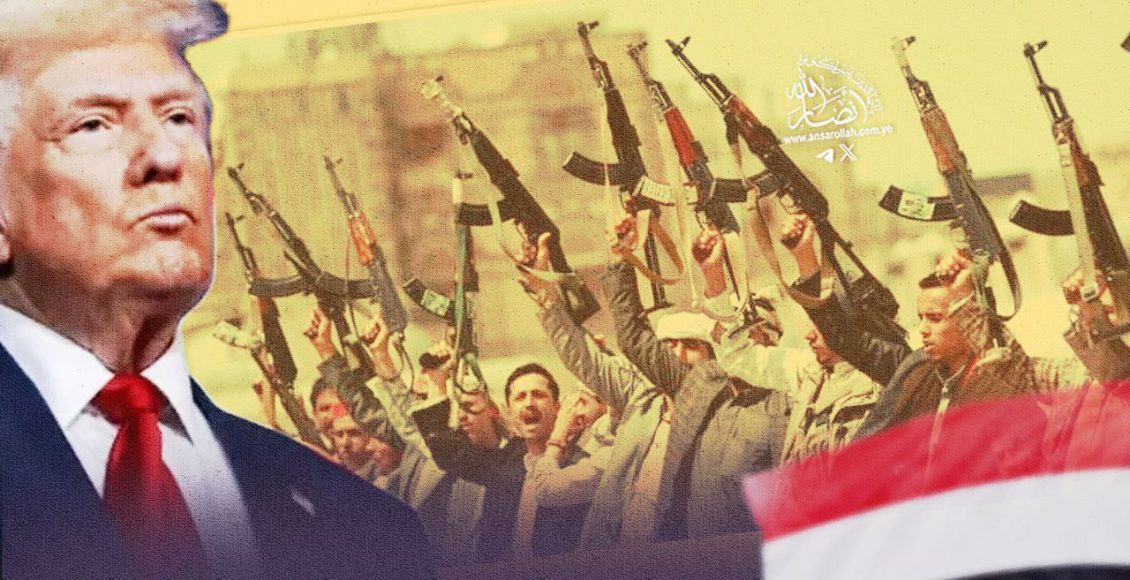In a move reflecting shifting regional and international dynamics, U.S. President Trump signed an executive order to reclassify Yemen’s Ansar Allah movement as a “Foreign Terrorist Organization.” This decision is a direct response to the role played by Yemen’s armed forces in recent battles, including direct confrontations with U.S. naval forces. It aligns with Trump’s aggressive foreign policy, a stance he publicly declared during his electoral campaign.
While the classification ostensibly targets a specific Yemeni entity, its broader repercussions will be felt by the entire Yemeni population. This designation punishes Yemen as a whole, as its economic and political consequences do not distinguish between different regions or groups. A similar precedent was set with the relocation of Yemen’s central bank from Sana’a to Aden. Although framed as a measure targeting Sana’a and the Supreme Political Council, its economic fallout affected Yemen’s overall economy, destabilizing currency exchange rates and financial systems in both Sana’a and Aden.
A Tool of U.S. Foreign Policy
The use of terrorism designations has long been a staple of U.S. foreign policy, primarily targeting liberation movements and resistance forces worldwide. There remains no universally accepted definition of “terrorism,” as formalizing one could expose the U.S., Western nations, and the Israeli entity as violators of international laws against war crimes and crimes against humanity.
The Executive Order and Its Directives
The executive order directs the U.S. Secretary of State to implement the designation within 30 days of its signing, which coincided with Trump’s return to office for his second term on January 20, 2025. It outlines a policy of collaborating with regional allies to weaken Yemeni capabilities—particularly in Sana’a—by depriving the country of critical resources. This aims to pressure the Yemeni government while targeting its missile, drone, and naval defense systems, which have supported Palestinian resistance and safeguarded Yemen’s sovereignty.
Additionally, the order mandates the U.S. Agency for International Development (USAID) and the State Department to jointly review the activities of United Nations partners, NGOs, and contractors operating in Yemen.
Under U.S. law, designating an organization as a “Foreign Terrorist Organization” criminalizes any individual or entity suspected of providing support or resources to Ansar Allah or Yemen’s national government. This designation freezes Ansar Allah’s assets and imposes travel bans on the Yemeni people while threatening individuals and companies worldwide with prosecution for alleged material support.
Economic Consequences
This decision primarily targets Yemen’s economy, with likely ramifications for institutions managed by the National Salvation Government in Sana’a, such as the port of Hodeidah, the central bank, and private banks headquartered in the capital. Economic restrictions will impede Sana’a’s ability to finance commercial and financial activities, amounting to collective punishment for the Yemeni people.
The reclassification exacerbates tensions between banks in Sana’a and the Aden-based central bank. It risks freezing assets, restricting financial transactions, and imposing sanctions, as seen previously with the U.S. sanctions on the Yemen and Kuwait Bank. Such measures force financial institutions to relocate their headquarters to Aden, potentially restoring the punitive actions previously lifted under pressure from Yemen’s revolutionary leadership.
Overall, this designation signifies a renewed phase of economic warfare targeting all Yemenis.
Political Implications
Politically, the classification could hinder peace efforts, entrenching the current divisions and prolonging Yemen’s state of “neither peace nor war.” It sustains the economic disparity between Sana’a, which faces escalating pressures, and Aden, which benefits from international donor conferences like the recent one in New York. This imbalance strengthens the political and economic standing of pro-coalition factions, potentially reigniting hostilities between the coalition and Yemen’s armed forces, despite the recent Omani-brokered truce.
Humanitarian Impacts
On the humanitarian front, international organizations operating in Sana’a have already established branches in Aden over recent years. Increased pressure due to this designation may compel these organizations to relocate entirely to Aden, disrupting aid delivery to areas under the Supreme Political Council.
Rashad Al-Alimi, leader of the so-called “Presidential Leadership Council,” has pledged to ensure his government facilitates continued humanitarian aid in Yemen. However, his promises mirror those of former President Hadi, who assured uninterrupted salary payments to all Yemeni employees after the central bank’s relocation to Aden—a promise that went unfulfilled.
Military Objectives
The economic sanctions are designed to undermine Yemen’s ability to sustain and advance its military industries, weakening its defenses against maritime aggression. By targeting Yemen’s military capabilities, the U.S. aims to limit its support for the Palestinian resistance and diminish its ability to counter future threats from the Israeli entity or other adversaries.
The increased pressure on Yemen’s national government could lead to renewed confrontations with U.S. and British naval forces, as well as with Saudi Arabia and the UAE. This would return Yemen to the pre-truce landscape of heightened conflict.
Conclusion
The U.S. designation of Ansar Allah as a terrorist organization represents a declaration of war against the Yemeni people, armed forces, and national leadership. It marks a continuation of the aggression that began in 2015. However, just as Yemen’s revolutionary leadership and people resisted the earlier onslaught, they remain resolute in facing these new challenges, retaining the tools and determination necessary to defend their sovereignty and secure their rights against any form of aggression and oppression with Allah's support.







